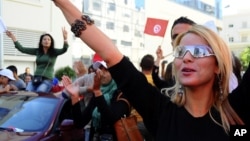With a new secular alliance emerging victorious in Tunisia's recent legislative elections, winning 85 of the 217 seats in parliament, analysts say Tunisia’s democracy is on the right path.
“It is another big step toward a democratic transition in Tunisia that stands in contrast to the upheavals elsewhere since the birth of Arab Spring,” said Amy Hawthorne, a senior fellow at the Atlantic Council’s Hariri Center for the Middle East.
The alliance Nidaa Tounes - whose name means "Call for Tunisia" - took the most votes, but not enough for a majority of seats.
Hawthorne said she detected some fear among voters that the alliance victory comes with many figures from the old regime who could lead to a government that does not embrace democratic practices.
But the Tunisian ambassador to the United States, Mohamed Chelaifa, is optimistic.
“There is no fear of returning to the old regime,” he said. “Tunisia has achieved a new landmark success, opening the door for a new step toward democratic consolidation.”
Options for a coalition government
Presidential elections are set for November 23 and there is no candidate from Ennahda.
Veteran politician Beji Caid Essebsi, the 87- year-old leader of Nidaa Tounes, is the favorite to win the elections. But since his party doesn’t have enough seats to govern alone it will need a working coalition.
Diplomat Chelaifa said options include forming a national unity government involving the moderate Islamist Ennahda party, or the emergence of a non-partisan technocrat government.
“The third option is a coalition government led by Nidaa Tounes and involving political allies from small parties leaving Ennahda in the opposition,” he said.
But leaving Ennahda out of the government would be a big mistake, said Stephen McInerney, executive director of the Project on Middle East Democracy.
“Nidaa Tounes feels much empowered by elections results and that may lead its politicians not to include Ennahda in the coalition and rely instead on smaller parties,” McInerney said. “That could lead to less cohesive coalition because the third block of seats belongs to the Free Patriotic Union which might not be a reliable partner with its inner infighting.”
Daniel Brumberg, a special advisor to the U.S. Institute of Peace, said there are signals from Nidaa Tounes that it does not intend to form a coalition with Ennahda. That would be a miscalculation, he said.
“If Nidaa Tounes opted to build a coalition with the so-called modernist parties they will end up splitting over economic issues in a fundamental way,” he said.
Big challenges for new government
While forming a new government and electing a new Tunisian president are the immediate challenges, experts warn that whoever leads Tunisia will face daunting economic and security challenges.
William Lawrence, director for Middle East and North Africa program at the Center for the Study of Islam and Democracy, said a poll shows 88 percent of Tunisians are dissatisfied with the economy.
“Many of the Tunisians who voted did not vote for parties, they voted for jobs and better livelihoods,” Lawrence said. “The other big challenge is home-grown terrorism, the security problems emanating from porous borders with Libya and Algeria and the three thousand Tunisians who have joined the fight with the Islamic State.”
But Chalaifa acknowledged that battling terrorism needs more efforts and resources – and curbing it is essential for a country that relies heavily on tourism – he said that the economy also needs immediate attention.
“Actions on the economic front and urgent solutions have to be found to offer new hope for young Tunisians in particular,” Chelaifa said. “Failure to meet expectations could result in disillusion with democracy itself and bring about the risk of instability.”
US can strengthen Tunisian success
President Barack Obama praised Tunisia for its elections calling it an “important milestone” in the country’s transition and an example for the region about consensus and political pluralism.
Chalaifa said the United States can offer help in budget support, countering terrorism and on the economic front.
“The U.S. can start negotiations on a free trade agreement, reaching a provisional trade arrangement to provide a privileged access to Tunisian products,” he said.
Analyst Lawrence said the U.S. has a stake in the success of the democratic process in Tunisia as a first truly democratic partner in the Arab world.
“The U.S. should support the most important model for how democracy can work in the Arab world through political dialogue and political inclusion.” Lawrence said. “That is the ultimate answer in Egypt, Libya, Syria, Iraq and elsewhere if they wanted to proceed with a real democratic transition.”




